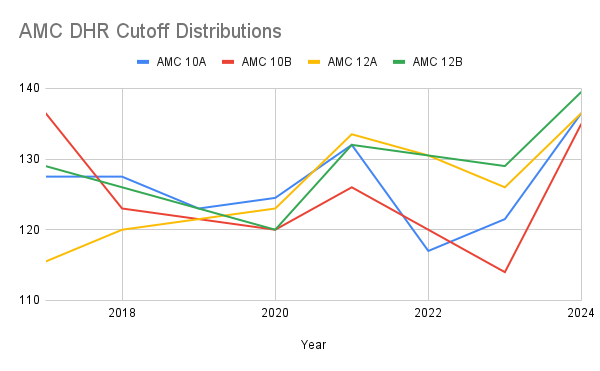In November, shocking news gripped competitive math communities around the U.S.: the AMC 12A problems were leaked.
To explain: The American Mathematics Competitions, colloquially known as the AMCs, are a 73-year-old contest for mathletes. Held every November, the AMCs, split into the AMC 10A/B for students in their sophomore year and younger and the AMC 12A/B for juniors and seniors, hold high importance in the competitive math community. Students qualify for invitational contests like the American Invitational Math Exam (AIME) and Math Prize for Girls (MPFG) through their AMC scores, and high AMC scores qualify students for the U.S.A. (Junior) Math Olympiad (USA(J)MO) more easily. The country’s International Mathematical Olympiad (IMO) team is decided through a succession of contests starting from AMC 10 and 12. In essence, it is the first rung in a line of prestigious competitions.

This year’s AMCs were hosted on November 8 and 14. On November 4, an AoPS (Art of Problem Solving, a popular math website) user reportedly named PyramidScheme (plus or minus some spaces and capitalizations — the denizens of AoPS forums are not sticklers for grammatical accuracy) took to the forums, various Discord servers and direct messages with questions pertaining to a supposed “mock contest,” asking for help and solutions. Suspicion arose, but not before some hundreds of people saw the “mock.” Mere hours later, a student took the test to his contest manager, who confirmed the authenticity of the problems. The leaker was subsequently banned from the contest servers, and the AoPS threads were deleted. Around the same time, leaked problems were reported to appear on other websites and apps, including WeChat and XiaoHongShu, where some were allegedly selling problems for up to hundreds of dollars. This continued until the day of the test, during which someone posted an entire video documenting all the problems and solutions before many students had even taken it. According to the live AMC statistics page (when it still existed), this led to higher statistics and scores than in previous years, and rumors abounded of students who scarcely studied for these competitions earning very high scores. The statistics page was soon taken down. During the AMC 10/12B a week later, there was no similar problem with posted problems, as the MAA, which organizes the AMCs, postponed problem release to a day before the test. However, social media users still began to spread pre-order links for problems. The MAA did not post the score distribution for the AMC 10/12B.
Let’s look into the circumstances surrounding the leak. To start, AMC problems are usually sent to proctors about a week before the test (although for the AMC B, the MAA delayed until a day before the test). Some organizations took advantage of that, as shown by the various leaks on social media. Lakeside Math Team Coach Dean Ballard adds, “There may be a temptation to blame the new AMC organizers for this problem, but the chance of a leak is an unavoidable part of this exam. With thousands of test managers and sites, there has always been time between receiving the exam and giving it (it used to be a lot longer!), so there will always be a chance of a leak.” For such a large contest, the logistics are likely a nightmare, leading to the necessity of test distribution beforehand.
In the past, the urban legend has been that cheating existed at smaller scales due to the time difference between different parties taking the test. The MAA policy allows the AMCs from 8:00 a.m. to 11:59 p.m. EST on the designated date to administer the contest, though notably not the AIMEs or Olympiads, which have only one extra hour of leeway. However, this seems to be the first wide-scale, pre-test, publicized knowledge of a leak. Although especially disappointing for those whose chances were potentially hurt by the leak, it is an opportunity to patch up some of the flaws in the AMC system.
In response to the reports of leaks and cheating, the MAA wrote on their website that they “have been monitoring online channels and have already identified the source of the leak,” and that they had banned them from hosting future AMCs. In the same announcement, they further revealed that their “AMC administration platform has mechanisms in place, utilizing both human resources and artificial intelligence, to identify broad statistical anomalies, as well as anomalies within individual competitors.”
Logistically, anomaly identification would likely include analysis of former scores and reasonable bounds of improvement (meaning, for instance, that a too-great difference in score between years might be flagged). This is, however, speculation, as I have not found further explanation of the policy (which makes sense: Full transparency could give rise to more loopholes). Though, as a few anonymous respondents pointed out, given the large number of test-takers and individual variation and circumstance, this strategy might produce questionable results.
When asked for comment, some Lakeside students expressed a belief that the MAA could tighten security around the test by making it completely online, like AP exams, and by preparing more backup questions. They also acknowledged the MAA’s problems with lack of funding and logistics, but thought that overall they should have done more in response to the leaks. Again, while the MAA could have responded more effectively, they too were in a difficult position and are not solely to blame. “I sympathize with the problem the AMC was stuck with,” Mr. Ballard says. “They had very little time to put together an alternative exam, and trying to reschedule the exams at the last minute could have a ton of unpleasant consequences.” One student also spoke to potential ramifications, saying, “I think it’ll definitely make AIME less prestigious, which is such a shame because so many people have dedicated so much time to preparing.”
Indeed, that lies at the heart of the problem. As a petition on Change.org put it, “For the numerous dedicated students who have invested considerable time in preparation, this act of malfeasance undermines not just their potential achievements but also the very spirit of scholarly competition. It is these students who stand to lose the most, their earnest efforts eclipsed by the dishonesty of others.” As someone who has participated in these contests myself, I can relate. Often, improvement of a few problems on the AMCs or AIME is the result of hours of continuous practice flipping through previous years’ problems or working on specific topics from books or problem sets, not to mention chance: the quality of sleep before the test or how many sillies (stupid mistakes) one does. Students work for so long, often years, to achieve high scores. Cheating neither shows personal improvement and gratification nor demonstrates high academic achievement to institutions and the public; it simply detracts from the integrity of the contest and gradually takes away from what would otherwise be a venue for aspiring mathletes to show their progress and talent. As such, some organizations have emailed the MAA asking to implement more strict policies around cheating so that strong deterrents exist.
Mr. Ballard explains the entire fiasco well when he says, “I should add that my primary reaction to this is sadness. It makes no sense to leak the exam in this way. It’s really just pointless mischief.” He adds that, “I hope this occasion will cause the [competition math community] to recommit to the highest possible ethical standards.”
Line Plot data from https://artofproblemsolving.com/wiki/index.php/AMC_historical_results#2021_Spring

